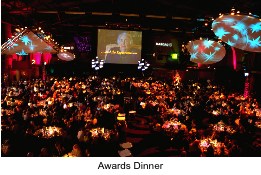| The Practical and Sentimental Fruits of Science | ||||||||
| Frank Oppenheimer, Exploratorium Fifteenth Anniversary Awards Dinner Speech, November 1984 | ||||||||
| In December of 1984, the Exploratorium held its Eighth Annual Awards Dinner. The year also marked the museum's fifteenth anniversary. At the dinner, Frank spoke on 'The Practical and Sentimental Fruits of Science. ' The complete text of his speech is reprinted here. |  | |||||||
| Thank you all very much for coming. I also want to thank the staff of the Exploratorium. Because of our roof reconstruction this place was open to the rainy atmosphere over the weekend when seven thousand people came. Then, to compound the mess, it rained all day yesterday. Yet the entire staff conspired and worked to make this place took as nice as it does tonight. I was extraordinarily honored when Bill Hewlett let us honor him at this dinner. It is for us a great privilege to be able to do so. I'm not going to talk about the Exploratorium. I resist the temptation to do so because I want to talk more broadly about science. There are some aspects of science that I think are not generally understood. In the first place, when people talk about civic cultural institutions they do not usually include science museums as part of their image of culture. Before we started this place, I noticed that universities would have museums of art, geology and anthropology exhibits, but rarely museums of the physical or biological or social sciences. Yet when we describe older cultures, we always include their world view. When we think of the Druids we are impressed by how well they had recorded the seasons and how well even earlier people had recorded eclipses and tides. We show their tools and their technology; we talk about all their myths about nature and include all these as a part of what we think of as culture in distant civilizations. | ||||||||
| But these are also part of the culture in our civilization. One of the reasons that physics, chemistry, and biology are not assimilated into our view of our culture is that these subjects are taught primarily as vocational ones. Furthermore, they are taught unimaginatively and are not integrated with other aspects of our culture. I hope this situation can change. It would be good to come back to the days in which physics was thought of as natural philosophy. The basic objective of science is to discover, understand, and unify what's happening around us, whether in living things or inanimate things. Very often people talk about the scientific method, but I believe that the way of understanding in science has a great deal in common with the way of understanding anything. Yet there are a couple of very special things about science that are not part of its methodology really, but which are crucial to its progress. One of these is that if you are genuinely trying to understand what's going on around you, then there's no point fooling yourself, or, for that matter, fooling any of your colleagues. Within the scientific community there is a tradition that anybody who fabricates data is completely ostracized. This tradition is one of the basic tenets of science, and science | ||||||||